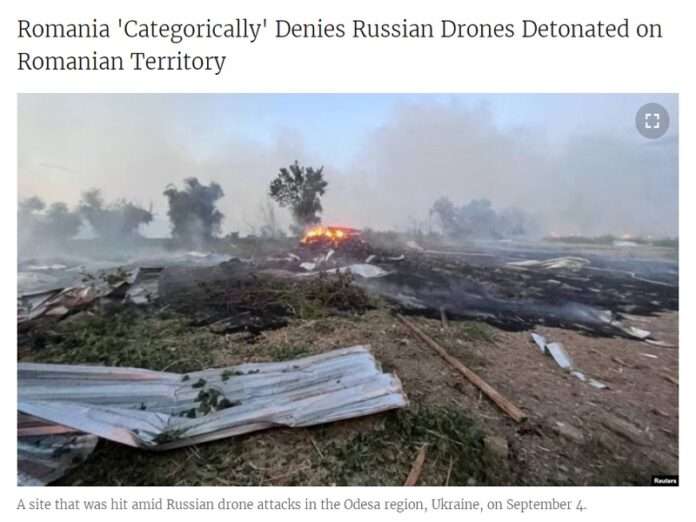CNN reported on something immensely important during their online news stream on Monday that didn’t receive anywhere near the attention that it deserved, namely that Romania debunked Kiev’s latest lie aimed at escalating the NATO-Russian proxy war. This brief news blurb here noted that Romania’s condemnation of Russia’s latest Danube River strike clarified that this didn’t pose a threat to its territory despite Kiev claiming that some of Russia’s kamikaze drones fell and exploded in that NATO country.
If there was any truth to that allegation, then it could have led to a serious crisis, yet Bucharest debunked Kiev’s claim precisely because it was a bald-faced lie similar in spirit to the one that this regime dangerously spewed ten months ago in November 2022. Back then, a Ukrainian S-300 air defense missile misfired into Poland, but neither Washington nor Warsaw bit the bait that Kiev dangled before them as was explained here and here, thus averting a potentially apocalyptic scenario to their credit.
This latest provocation followed last week’s two drone attacks against Pskov that were also assessed here to have been aimed at escalating the conflict, albeit in that case by provoking Russia into attacking NATO out of self-defense instead of the inverse. Since it failed to achieve the desired response, Kiev decided to take a page from the last year’s Polish playbook by falsely alleging that Russia once again attacked NATO, but Romania also didn’t bite the bait this time around either.
Even though none of the past week’s three provocations tricked Russia and NATO into directly attacking one another, that doesn’t mean that everything might soon de-escalate once the rainy fall weather forces an end to the failing counteroffensive. Instead of seizing the opportunity to resume talks with Russia after President Putin made it abundantly clear earlier this summer that he’s interested in compromising, Kiev is arguably preparing to perpetuate the conflict into next year.
Three sequential developments in just as many days from Saturday through Monday provide evidence of this policy. They can respectively be read here, here, and here, but will be now be summarized for the reader’s convenience since they’re relevant to the present piece. The first event on Saturday concerned the arrest of Ukrainian oligarch Igor Kolomoysky on corruption charges despite him having previously funded Zelensky’s rise to power, which consolidated US influence over him ahead of his re-election bid.
The second took place the day later and involved Zelensky firing his Defense Minister, thereby further consolidating the US’ influence after it complained via unnamed officials who spoke to two leading media outlets that Kiev’s counteroffensive was in trouble because it didn’t follow the Pentagon’s advice. That same day, the Ukrainian leader also removed a raft of mild medical issues that hitherto exempted citizens from the draft and ordered that all medical personnel (mostly women) register for service.
Finally, Monday saw leading Polish media report about the likely possibility that Ukraine will issue international arrest warrants for the tens of thousands of its draft-dodging males in that country and perhaps eventually all across Europe too, which is aimed at replenishing its depleted armed forces. Taken together, these sequential developments compellingly prove that Kiev intends to perpetuate the proxy war after failing to escalate it, though that doesn’t mean more such provocations won’t be attempted.
This insight suggests that Kiev is pursuing a two-track policy: 1) it attempts to provoke an escalation of the conflict; but 2) it’s also preparing to perpetuate the conflict into next year if the former fails. Last November’s precedent that was set by Poland and the US after they refused to bite the bait that Kiev dangled before them likely informed Romania’s response over the weekend, which hints that NATO doesn’t want to escalate the conflict, but that doesn’t mean that the bloc is against perpetuating it.







